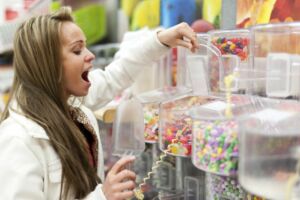Opinion
Prospects of the City: Exactly like kids in a candy store
Per Smidl
This article is more than 9 years old.

Looks like she needs to grow a little. As well as growing up
In which the prospector ponders the spread in recent years of candy stores by such names as ‘King’s Candy’, ‘Mega-store Candy’, ‘Candilicious’ and ‘Øresunds Candy’.
Red-eye candy
When I left Denmark to live in Prague in 1993, the custom that goes by the epithet ‘fredags slik’ (Friday candy) was as yet non-existent. Or at least I was not aware of it.
When I came back to my native country 12 years later in 2005, I was surprised to find the custom not only established, but downright entrenched. And today, ten years later, little candy palaces are popping up all over Copenhagen.
What all these places have in common is that they cater to this fairly new and rather obscene family custom of every Friday evening filling a bowl or two with candy and then munching away whilst watching television.
What has happened to cause this change? Is it perhaps due to an ever-spreading loneliness, a dysfunctional democracy or a profound change in family relations?
Sweet bird of youth
It is hard to say. When I was a child, Danish adults did not buy and eat candy. Only we kids did that. When my sisters and I arrived in Viborg for Christmas, the first thing we did was run down to Sigrid Højlund who had a chocolate shop in my grandparents’ building. Free of charge this nice lady would fill a bag with candy for each of us and wish us “Merry Christmas”.
Oh, how I used to love the salty ammoniac liquorice called ‘Piratos’. Licking one with the underside of my tongue would make grains of salt gradually appear and transmit a wonderful raspy sensation that I can still recall if I close my eyes.
But today it is enough for me that it became me well when I was a boy of ten. I no longer have any need or taste for candy. But a lot of Danish adults eat a lot of candy. Why?
Hygge diabetes
How did a bag of candy for Christmas turn into a bowl of candy every Friday night when the family wants to ‘hygge’ together? If it is hard to say regarding individual cases, but it is obvious the Danes’ seemingly insatiable sweet-tooth is generating enormous profits.
This leads me to another question: what are the consequences of so many people, children and adult-children alike, consuming such inordinate amounts of sugar in their daily lives?
Well, apart from the money that must be earned in order to sustain the candy addiction, it also means there is a gigantic health hazard involved for the candy consumers – a hazard that is apparently outweighed by the pleasure of the sugar-coated hygge.
At least this is what I told my Czech visitors the other day, when they came across a mega-candy store in Copenhagen and could not understand the reason for the phenomenon. I told them about Danish hygge and to be wary when candy is advertised as an innocent and harmless sweetener of life.
And meanwhile we Danes wonder why diabetes and obesity are on the rampage among us.

About
Per Smidl
As the author of the 1995 essay ’Victim of Welfare. An Essay on State and Individual in Denmark’ and 2011 novel ’Wagon 537 Christiania’, Per Smidl is no stranger to controversy. After 12 years of self-imposed exile in Prague, he is back in his native Copenhagen, a city he will always have a unique perspective on.










































